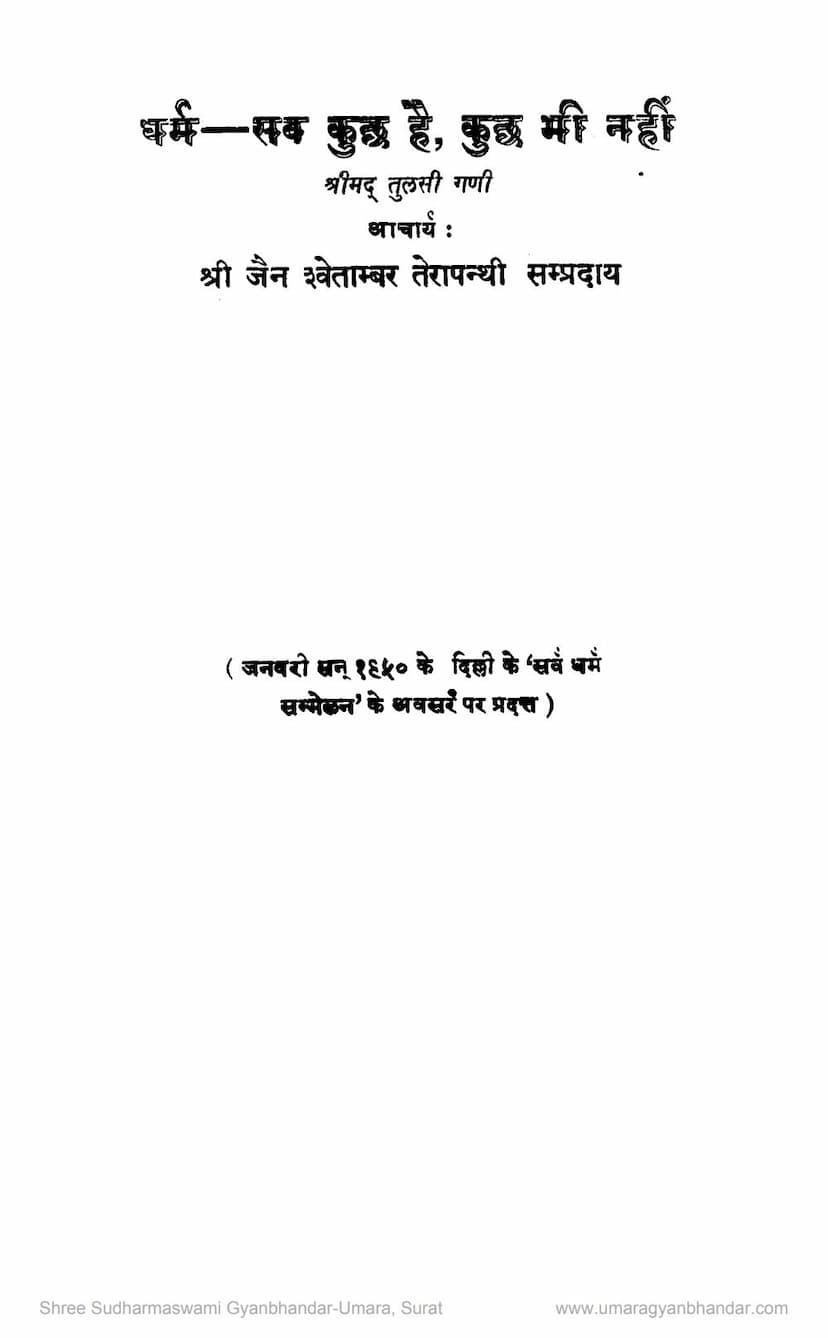Dharm Sab Kuch Hai Kuchbhi Nahi
Added to library: September 1, 2025

Summary
Here is a comprehensive summary of the Jain text "Dharm Sab Kuch Hai Kuchbhi Nahi" by Acharya Tulsi, based on the provided pages:
Book Title: Dharm Sab Kuch Hai Kuchbhi Nahi (Religion is Everything, Religion is Nothing) Author: Acharya Tulsi Publisher: Jain Shwetambar Terapanthi Sampraday Context: This text is based on an address given by Acharya Tulsi at the "Sarvadharma Sammelan" (All Religions Conference) in Delhi in January 1950.
Core Message:
The central thesis of Acharya Tulsi's discourse is that true religion, when practiced, is the ultimate solution to all problems and the source of all happiness and peace. However, if religion is merely a superficial concept or misunderstood, it becomes meaningless and incapable of achieving anything. The title itself, "Religion is Everything, Religion is Nothing," encapsulates this duality.
Key Themes and Arguments:
-
The Source of Peace and Unrest:
- Acharya Tulsi posits that humanity itself is the father of both peace and unrest.
- Inner peace is a constant, flowing source within us. However, the allure of external objects and desires leads humanity astray, causing unrest.
- People forget their true selves, and peace withdraws.
- True peace is not found in the external world or through external possessions; it is an inherent quality that is both the goal (साध्य) and the means (साधन) in itself.
-
The Role of Possessions (Parigraha) and Contentment:
- The desire for possessions (एष्णा) and the pursuit of accumulation, even for a worldly emperor, do not bring happiness.
- A contented person, even if poor, is happy. This demonstrates that peace lies in non-possession (अपरिग्रह).
- Lord Mahavir's teaching that "there is no bondage like possessions" is highlighted.
- While complete non-possession might be difficult for householders, striving to minimize life's necessities and recognizing accumulation as the root of harm can lead to peace.
-
The Role of Non-Violence (Ahimsa) and Compassion:
- Someone who rules the entire world without causing harm sleeps soundly for a mere moment, while someone who considers all beings equal to themselves is not agitated even slightly. This illustrates that peace is found in non-violence.
- The mantra of peace-loving individuals is: "The entire world is our friend; we have no enmity with anyone."
- Even householders can contribute to world peace by avoiding unnecessary violence and not usurping the rights of others.
-
The Role of Restraint (Sanyam) and Self-Control:
- Those who cannot control their senses, mind, and speech give rise to conflict and discord. This shows that peace is absent in indiscipline and lack of restraint.
- The teachings of the liberated ones (वीतराग वाणी) identify non-violence, restraint, and penance (अहिंसा, संयम, तप) as the true nature of religion.
- Without these core tenets of religion—non-violence, restraint, and non-possession—there is no seed of peace.
-
The Relationship Between Religion and Science:
- Acharya Tulsi argues that in the pursuit of truth, religion and science are not fundamentally different. Both aim to develop humanity and bring happiness.
- However, science has created a problem for itself and the world by neglecting the spiritual aspect (आत्मविकास) and the ultimate goal (परमात्म स्वरूप).
- If science had balanced its pursuit of external knowledge with self-development and the pursuit of inner happiness, the current state of the world would be very different.
-
The Primacy of Mental Problems:
- While society faces many problems like food shortages and poverty, Acharya Tulsi identifies the mental problem as the most complex and the root cause of others.
- If education incorporates spiritual principles and people come to value restrained individuals the most, then other problems can be resolved.
-
The Revival of Values:
- In ancient times, when restraint was valued more than wealth, the tendency to accumulate was not as strong.
- When violence, possessions, and greed extend beyond the needs of survival into the realm of insatiable desire, collective unrest arises.
- Religious leaders should advocate for and enforce limits on violence and accumulation.
-
Conclusion: The Power of Practice:
- Acharya Tulsi concludes that if religion is practiced, it is all-powerful and capable of bringing happiness to the entire world.
- If religion is not practiced, it is nothing and cannot achieve anything.
- Therefore, those seeking religion must cultivate self-control, as this is the path to successfully adorning religion.
In essence, the text emphasizes that religion is not merely a set of beliefs or rituals, but a way of life characterized by non-violence, self-control, and detachment. When these principles are lived, religion becomes the panacea for all individual and societal ills. When they are ignored or misunderstood, religion loses its power and significance.